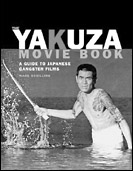The Yakuza Movie Book: A Guide to Japanese Gangster Films
by Tom Mes
The yakuza genre is one of the most enduring, and enduringly popular, in Japanese cinema. With the recent growth in the ranks of foreign fans of Japanese cinema largely thanks to the work of people like Takeshi Kitano and Takashi Miike, the gangster film currently also seems to be one of the representative genres for the nation's cinematic output, particularly from a western perspective.
For this reason, Mark Schilling's The Yakuza Movie Book is a very timely and welcome guidebook. But it's also a very necessary one. Despite the growing fan base for the genre, there are still very few westerners who can tell the difference between a Fukasaku gang film and a Tai Kato one, or how the house styles of the various studios like Toei and Nikkatsu influenced the films of the directors they had under contract, or how important the production of straight-to-video yakuza movies has been on some of today's most respected auteurs. Such matters are key elements in understanding the works of directors like Seijun Suzuki, Kinji Fukasaku, Teruo Ishii and Kiyoshi Kurosawa, to name but a very small selection.
Schilling's book will go a long way towards filling in the gaps in our knowledge. The detailed essay on the history of the yakuza genre that opens the book neatly separates Toei ninkyo eiga (the 'classic' form of the yakuza film) from Nikkatsu borderless action (which spawned Suzuki's free form flicks) and from the jitsuroku (true story) films popularised by Fukasaku's Battles Without Honour and Humanity (a division with which even seasoned chroniclers of Japan's film industry have been known to struggle). This is followed by a series of portraits of some the genre's major players, both actors and directors. The interviews are often very revealing of their subjects' personalities, with Kinji Fukasaku coming off as an erudite cinephile, Teruo Ishii as an absent-minded tinkerer, Rokuro Mochizuki as a level-headed yet passionate pragmatist, and Seijun Suzuki as an impish prankster. Bunta Sugawara reveals more than a smattering of hypocrisy as he derides V-cinema for not being "real movies". "Yakuza films ended with me", he proudly states, conveniently forgetting that he starred in more than his share of straight-to-video dross during the 1990s.
The bulk of the book is devoted to reviews of a selection of 100+ films, representing the various guises of the genre (including some very outrageous examples like Yusaku Matsuda's A Homansu and Teruo Ishii's period yakuza/horror chronicle The Yakuza's Law: Lynching). All the usual suspects are represented, though some to a lesser extent than they perhaps deserve. Some of the reviews are culled verbatim from Schilling's backlog of reviews for the Japan Times, and their format has not been adapted to fit the two-tiered synopsis/critique style of those newly written for the book. Despite the vast majority of the material being new and despite the amount of time the project took up, this lack of consistency still occasionally gives the impression of things having been assembled with some haste, which is a shame and somewhat unnecessary.
In the end, however, The Yakuza Movie Book fills so many gaps and does it in such a convincing manner, that we can only applaud Schilling's efforts. Beyond being a book that fans of yakuza films old and new will (and should) lap up, it also contributes greatly to the understanding of an important but previously undervalued aspect of Japanese cinema.
